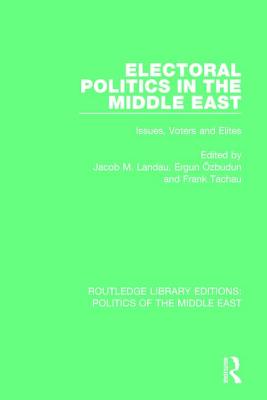Comparative political study of the Middle East got off to a late start. Unlike any previous studies in comparative politics, this book, first published in 1980, represents an important methodological advance in that it proceeds by themes rather than by countries, and uniquely focuses on three major aspects of electoral politics in three contemporary Middle Eastern states. The three countries – Turkey, Lebanon and Israel – are chosen because they are the only Middle Eastern countries with a tradition of free elections. On the other hand, they also display certain characteristics found in other, non-competitive Middle Eastern political systems, such as the role and prominence of religion. The study is based on extensive original research and presents the first comparative treatment of electoral issues, voting behaviour and parliamentary elites, emphasising the context of rapid socio-economic change – a theme particularly pertinent to those countries with their tradition of free elections. The variety of political behaviour within the countries concerned, coupled with the prevailing complexities resulting from disparities in language and cultural inheritance, makes the comparative approach particularly revealing. The attitudes and behaviour of the voters can be seen to be at least as important as the laws and mechanisms involved.
Comparative political study of the Middle East got off to a late start. Unlike any previous studies in comparative politics, this book, first published in 1980, represents an important methodological advance in that it proceeds by themes rather than by countries, and uniquely focuses on three major aspects of electoral politics in three contemporary Middle Eastern states. The three countries – Turkey, Lebanon and Israel – are chosen because they are the only Middle Eastern countries with a tradition of free elections. On the other hand, they also display certain characteristics found in other, non-competitive Middle Eastern political systems, such as the role and prominence of religion. The study is based on extensive original research and presents the first comparative treatment of electoral issues, voting behaviour and parliamentary elites, emphasising the context of rapid socio-economic change – a theme particularly pertinent to those countries with their tradition of free elections. The variety of political behaviour within the countries concerned, coupled with the prevailing complexities resulting from disparities in language and cultural inheritance, makes the comparative approach particularly revealing. The attitudes and behaviour of the voters can be seen to be at least as important as the laws and mechanisms involved.
Get Electoral Politics in the Middle East by at the best price and quality guranteed only at Werezi Africa largest book ecommerce store. The book was published by Taylor & Francis Ltd and it has pages. Enjoy Shopping Best Offers & Deals on books Online from Werezi - Receive at your doorstep - Fast Delivery - Secure mode of Payment
 Jacket, Women
Jacket, Women
 Woolend Jacket
Woolend Jacket
 Western denim
Western denim
 Mini Dresss
Mini Dresss
 Jacket, Women
Jacket, Women
 Woolend Jacket
Woolend Jacket
 Western denim
Western denim
 Mini Dresss
Mini Dresss
 Jacket, Women
Jacket, Women
 Woolend Jacket
Woolend Jacket
 Western denim
Western denim
 Mini Dresss
Mini Dresss
 Jacket, Women
Jacket, Women
 Woolend Jacket
Woolend Jacket
 Western denim
Western denim
 Mini Dresss
Mini Dresss
 Jacket, Women
Jacket, Women
 Woolend Jacket
Woolend Jacket
 Western denim
Western denim
 Mini Dresss
Mini Dresss






























































